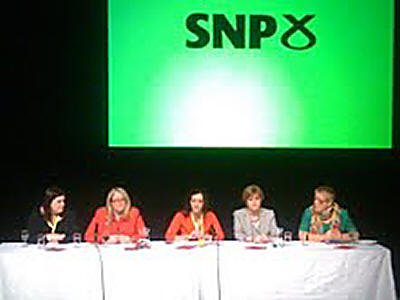|

Tasmina Ahmed-Sheikh
gives her views.
Political life, on a full time basis, is incredibly demanding. When I
talk to our MSPs, Iím intensely aware of the vast number of hours they
all put in and I know itís no different for our European colleagues. In
fact, you would probably be forgiven for suggesting our MEPs have an
even tougher time of it given the additional travelling and that one
week in four in Strasbourg.
I lead a very busy life already, and I know all of my friends do too.
Women Ė and there is scientific evidence to prove this Ė really are
better at multi-tasking than men. Itís what we do. We are pretty good at
juggling having children, doing the school runs and after school
activities, cooking, cleaning, shopping and somehow or other a lot of us
also manage to carry a full time job.
What that full time job is doesnít really matter when it comes to time
commitment. For many of us, an average working week stretches far beyond
the European Working Time Directive when you include all the unpaid work
we manage to fit into a week.
The European Union is acutely conscious of the gender balance question
in politics. Back in 2009, it produced a report called Women in European
Politics Ė Time for Action. You can find it here if you copy and paste
this link:
http://ec.europa.eu/social/BlobServlet?docId=2052&langId=en (pdf)
In that report, the authors make clear that women need and deserve more
opportunities and that the European Parliament would benefit overall
from a better gender balance. At the last EU elections in 2009, 255 of
the 736 MEPs elected were women. The national parliaments across the 27
member states vary quite a lot with Finland at the top of the ladder
with 62 per cent of its national parliament being female. The UK showing
is poor: just 33 per cent of UK MEPs are women putting it 65th out of
the 190 countries included in the Inter Parliamentary Unionís 1 February
2013 monitoring report.
In fact, action to address this imbalance is long overdue. There is a
range of ways in which we can work to make things better. What we really
need to concentrate on is how women perceive themselves and why it is
that we so often under-value our own abilities and skills.
What I am sure of is that I want to help bring about a shift in our own
attitude towards ourselves. Thatís certainly a component in why Iím
standing for election in the Euros next year.
It has been said that thereís a special place in hell for women who
donít help other women.
Thatís partly why I took on the role of SNP National Womenís Officer on
the NEC, the National Executive Committee. I genuinely want to help
women to recognise their own abilities and strengths so that we can all
achieve our full potential and move forward into the political arena.
If thereís one single thing that women need more of, itís
self-confidence. Iíve now established the foundations of the SNP Womenís
Academy which was launched by Deputy Leader, Nicola Sturgeon, at
Conference in Inverness in March.
The whole idea behind the Womenís Academy Mentoring Scheme is to give
women an opportunity to test out first hand what a day in the life of an
MSP is like. They will be able to see, when mentored by one of our
female members of the Scottish Parliament, that this is a job that
demands energy and commitment for sure, but itís also one that they may
well be more than qualified to take on.
Women get on most easily with people they feel they can relate to, with
whom they have something in common. When they see our female MSPs in
action, I believe they will see that shared cause; that same sense of a
determination to be the change makers.
Our Scottish Government is committed to change and more women need to be
in there helping to shape strategic direction right across the policy
portfolio. We make up more than half of the population so we donít need
to justify our presence. Arguably, we need to justify our lack of
presence.
If we want to bring about change, we need to be the change makers,
leading where we can, by example.
Thatís why Iím hoping to
get elected to the European Parliament next year. |

